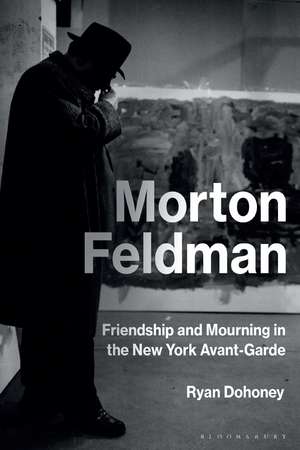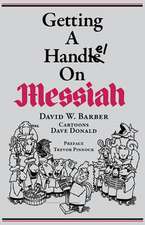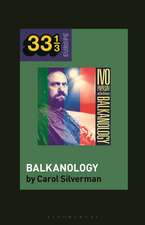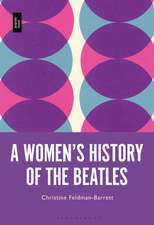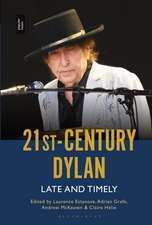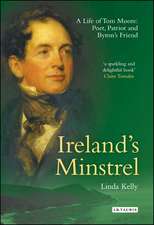Morton Feldman: Friendship and Mourning in the New York Avant-Garde
Autor Prof Ryan Dohoneyen Limba Engleză Paperback – 23 mar 2022
| Toate formatele și edițiile | Preț | Express |
|---|---|---|
| Paperback (1) | 153.62 lei 3-5 săpt. | +27.88 lei 7-11 zile |
| Bloomsbury Publishing – 23 mar 2022 | 153.62 lei 3-5 săpt. | +27.88 lei 7-11 zile |
| Hardback (1) | 509.93 lei 6-8 săpt. | |
| Bloomsbury Publishing – 23 mar 2022 | 509.93 lei 6-8 săpt. |
Preț: 153.62 lei
Preț vechi: 166.55 lei
-8% Nou
Puncte Express: 230
Preț estimativ în valută:
29.40€ • 31.92$ • 24.69£
29.40€ • 31.92$ • 24.69£
Carte disponibilă
Livrare economică 01-15 aprilie
Livrare express 18-22 martie pentru 37.87 lei
Preluare comenzi: 021 569.72.76
Specificații
ISBN-13: 9781501345456
ISBN-10: 1501345451
Pagini: 232
Ilustrații: 23 images
Dimensiuni: 152 x 229 x 20 mm
Greutate: 0.36 kg
Editura: Bloomsbury Publishing
Colecția Bloomsbury Academic
Locul publicării:New York, United States
ISBN-10: 1501345451
Pagini: 232
Ilustrații: 23 images
Dimensiuni: 152 x 229 x 20 mm
Greutate: 0.36 kg
Editura: Bloomsbury Publishing
Colecția Bloomsbury Academic
Locul publicării:New York, United States
Caracteristici
Places Morton Feldman in the wider context of friendships and collaborations with members of The New York School, and how these relationships played a role in influencing the avant-garde movement and experimental music
Notă biografică
Ryan Dohoney is Associate Professor of Musicology in the Bienen School of Music at Northwestern University, USA. He specializes in experimental music in the US and Europe since World War II.
Cuprins
List of IllustrationsIntroduction1. Spontaneity, Intimacy, and Friendship in the 1950s2. "Élan vital . and how to fake it"Intermission: The Necessary Other3. The Elegiac Science4. "We broke up because of style"Conclusion: Friendship's SilenceAcknowledgmentsBibliographyIndex
Recenzii
The book bears powerful testament to his proposal that in writing about friendships mediated through painting, poetry and music one can derive new insights into that painting, poetry and music.
Dohoney's graceful and affecting meditation on the plexus of Feldman's relationships compellingly surveys Feldman's dedication-and his dedications-to his friends, his love for poetry, painting, and for their makers, and the mourning and melancholy that ultimately tied them together. Feldman's music becomes increasingly concerned, in Dohoney's vivid account, with what survives, what endures, and what can still be heard, even as it ebbs.
Ryan Dohoney's book distinctively illuminates and contextualizes Morton Feldman's modernist music. It is an account of Feldman's relationships, in particular, with the poet and art writer Frank O'Hara and the visual artist Philip Guston. Two large themes emerge, friendship and death. This is a new kind of musicology, with much detailed historical research that also finds emotional elements central to understanding the music, an affective account of what Feldman would call his life in art. It puts together the personal and what we have "out there," the music.
Ryan Dohoney's fantastic book on Morton Feldman points to a Copernican turn within studies of the social life of the arts: trapped for decades in the domain of theme and anecdote, friendship here emerges instead as the infrastructure or medium it in fact is. Friendship thus does not "contextualize" Feldman's music from the outside, but rather enables and structures it from within, like the charged gaps between his notes.
Dohoney's graceful and affecting meditation on the plexus of Feldman's relationships compellingly surveys Feldman's dedication-and his dedications-to his friends, his love for poetry, painting, and for their makers, and the mourning and melancholy that ultimately tied them together. Feldman's music becomes increasingly concerned, in Dohoney's vivid account, with what survives, what endures, and what can still be heard, even as it ebbs.
Ryan Dohoney's book distinctively illuminates and contextualizes Morton Feldman's modernist music. It is an account of Feldman's relationships, in particular, with the poet and art writer Frank O'Hara and the visual artist Philip Guston. Two large themes emerge, friendship and death. This is a new kind of musicology, with much detailed historical research that also finds emotional elements central to understanding the music, an affective account of what Feldman would call his life in art. It puts together the personal and what we have "out there," the music.
Ryan Dohoney's fantastic book on Morton Feldman points to a Copernican turn within studies of the social life of the arts: trapped for decades in the domain of theme and anecdote, friendship here emerges instead as the infrastructure or medium it in fact is. Friendship thus does not "contextualize" Feldman's music from the outside, but rather enables and structures it from within, like the charged gaps between his notes.
